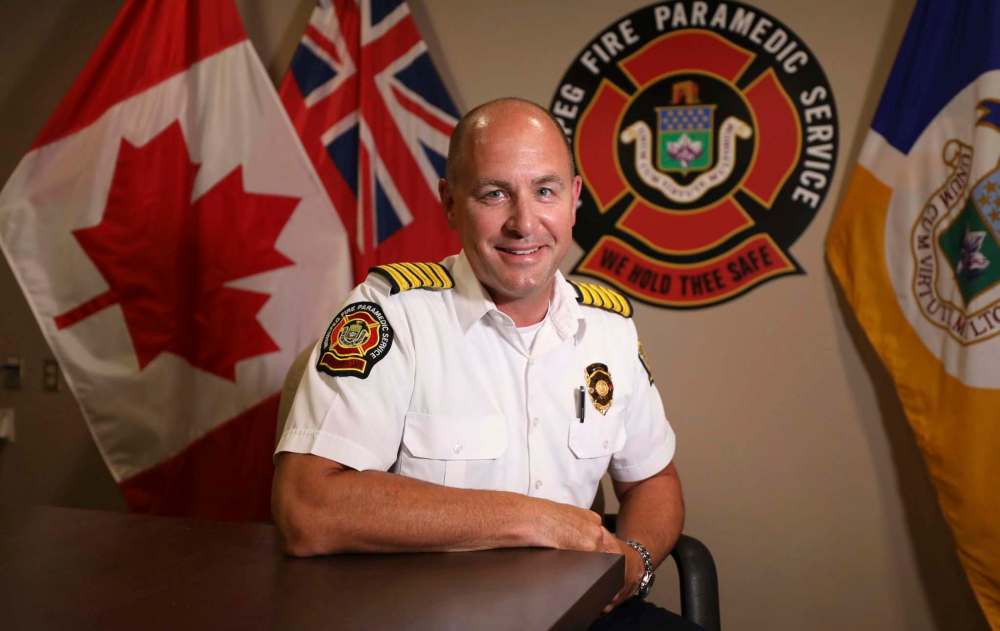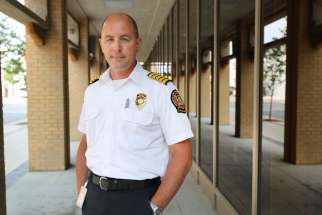On the hot seat New Winnipeg Fire Paramedic Service chief says healing infighting in department a top priority
Read this article for free:
or
Already have an account? Log in here »
To continue reading, please subscribe:
Monthly Digital Subscription
$0 for the first 4 weeks*
- Enjoy unlimited reading on winnipegfreepress.com
- Read the E-Edition, our digital replica newspaper
- Access News Break, our award-winning app
- Play interactive puzzles
*No charge for 4 weeks then price increases to the regular rate of $19.00 plus GST every four weeks. Offer available to new and qualified returning subscribers only. Cancel any time.
Monthly Digital Subscription
$4.75/week*
- Enjoy unlimited reading on winnipegfreepress.com
- Read the E-Edition, our digital replica newspaper
- Access News Break, our award-winning app
- Play interactive puzzles
*Billed as $19 plus GST every four weeks. Cancel any time.
To continue reading, please subscribe:
Add Free Press access to your Brandon Sun subscription for only an additional
$1 for the first 4 weeks*
*Your next subscription payment will increase by $1.00 and you will be charged $16.99 plus GST for four weeks. After four weeks, your payment will increase to $23.99 plus GST every four weeks.
Read unlimited articles for free today:
or
Already have an account? Log in here »
Hey there, time traveller!
This article was published 18/08/2021 (1573 days ago), so information in it may no longer be current.
Improving workplace relations within the Winnipeg Fire Paramedic Service will be a key goal for its new chief, after severe in-fighting between firefighters and paramedics played out publicly in recent months.
WFPS Chief Christian Schmidt, who officially began leading the department on Saturday after John Lane retired, said the service has completed the first phase of a workplace culture assessment meant to help reduce and prevent conflict.
“There are certain facets or areas where work needs to be done and, to be quite frank, there needs to be more (accountability) as a result of people’s actions and to ensure that people are in step with the organization’s values,” Schmidt said in an interview with the Free Press.

This spring, both the union that represents Winnipeg firefighters and the union that represents local paramedics issued separate calls to divide the emergency workers.
In March, the Manitoba Government and General Employees’ Union wrote to Winnipeg Mayor Brian Bowman, asking him to immediately remove paramedics from city fire halls, arguing conflicts with firefighters were creating an unsafe working environment. That letter came after a paramedic accused two firefighter colleagues of refusing to help treat a seriously injured Indigenous woman last fall and alleged that their actions were racially motivated.
A few days after the MGEU letter, the United Fire Fighters of Winnipeg called for the provincial government to take over ambulance services in Winnipeg.
“There are certain facets or areas where work needs to be done and, to be quite frank, there needs to be more (accountability) as a result of people’s actions and to ensure that people are in step with the organization’s values.”
– New WFPS Chief Christian Schmidt
While the divide between some workers appears substantial, Schmidt said a survey and in-depth interviews with staff at WFPS stations found most employees support the integrated Winnipeg Fire Paramedic Service model.
“In terms of pulling out (workers from) stations, that is not something that is on the table at this time… That’s also not something that the membership was asking for during the station visits,” said Schmidt.
The new chief said Winnipeggers can be confident workplace conflicts have not compromised patient care and the integrated model continues to ensure quick emergency response times.
“Our ability to get a licensed paramedic to a patient’s side in anywhere from four-and-a-half to six minutes (is something) other municipalities and other areas in this province simply are not able to achieve,” he said.
Schmidt said the service has started to provide equity, diversity and inclusion training for front-line leaders, who will also be trained on responding to workplace conflict.
Meanwhile, Schmidt said the WFPS also continues to face a paramedic and ambulance shortage. Last fall, Lane said he was “begging” Shared Health for 10 more ambulances and 120 more paramedics, over concerns staff were burning out and the least-sick patients were facing lengthy waits.
Schmidt said that problem persists and may be slightly worse now, as the pandemic drags on.
“The entire system has been under extreme stress because of COVID and the pandemic. But our system was under extreme stress going into the pandemic (too),” he said.
However, some patient wait times have improved, due to a secondary triage system, Schmidt said. That allows a paramedic to respond to the least acute 911 calls that could otherwise be left waiting, usually within about 30 minutes of an initial call for help.
Schmidt said early results of that effort appear promising, with the paramedic involved able to redirect many patients with less urgent needs to a family doctor, urgent care centre or another health-care provider.
“The entire system has been under extreme stress because of COVID and the pandemic. But our system was under extreme stress going into the pandemic (too).”
– New WFPS Chief Christian Schmidt
“The 911 system is extremely taxed right now. Volumes are increasing and we need to find other ways of handling some of the call volume other than sending… emergency vehicles with highly skilled licensed personnel out to the patient’s side,” he said.
However, more staff are still needed immediately, since the current workload doesn’t even leave time for breaks, he said.
The new fire chief brings both firefighting and paramedic experience to his leadership role. He joined the city as a front-line paramedic in 1993, has completed firefighting training and worked in the 911 communications centre, in addition to his executive experience.
joyanne.pursaga@freepress.mb.ca
Twitter: @joyanne_pursaga

Born and raised in Winnipeg, Joyanne loves to tell the stories of this city, especially when politics is involved. Joyanne became the city hall reporter for the Winnipeg Free Press in early 2020.
Our newsroom depends on a growing audience of readers to power our journalism. If you are not a paid reader, please consider becoming a subscriber.
Our newsroom depends on its audience of readers to power our journalism. Thank you for your support.












